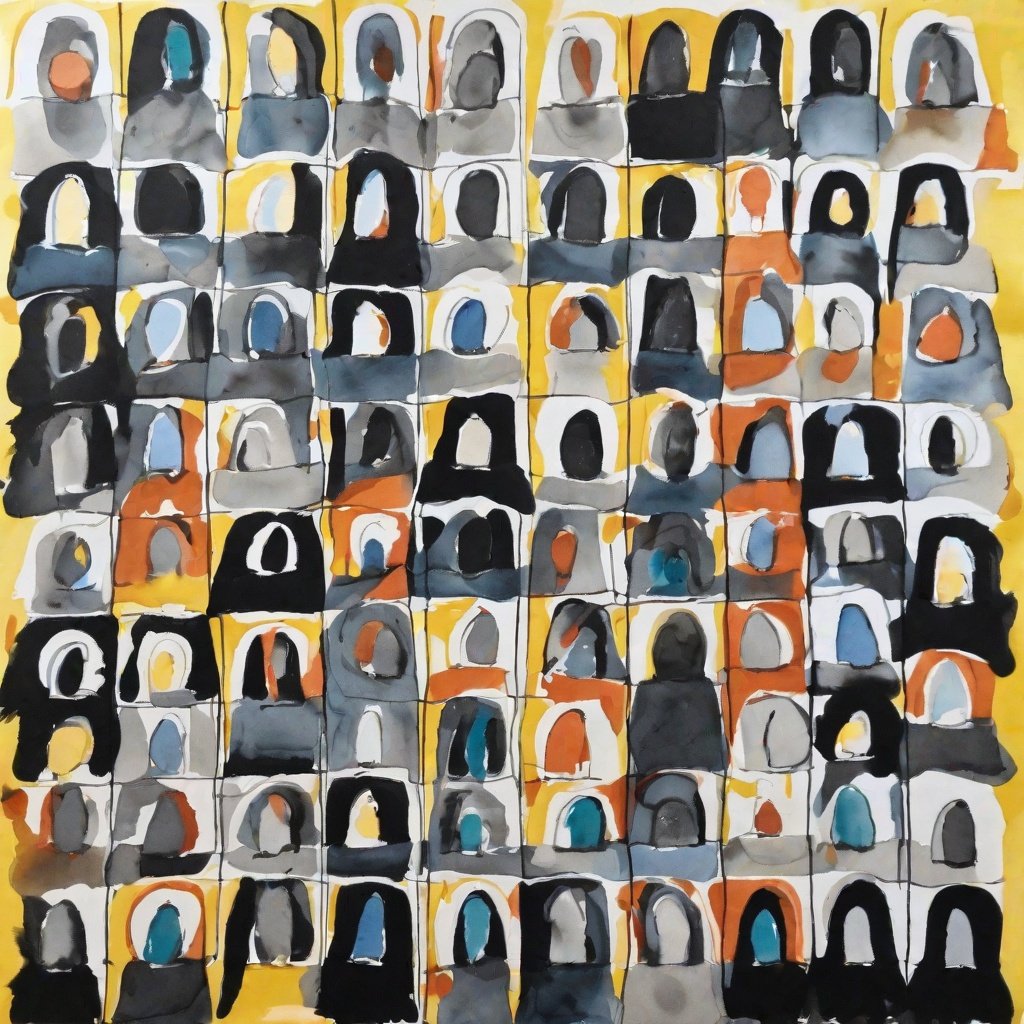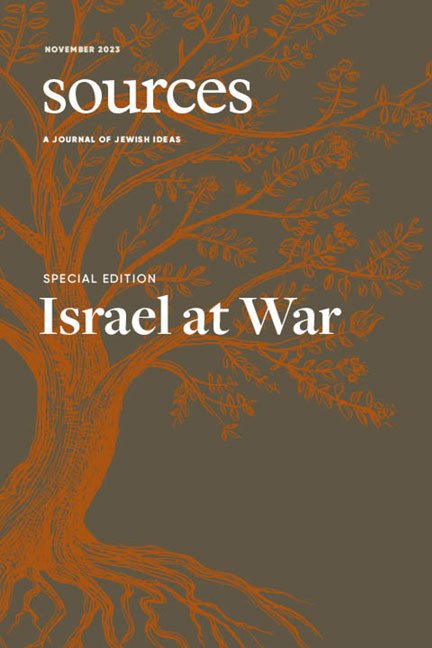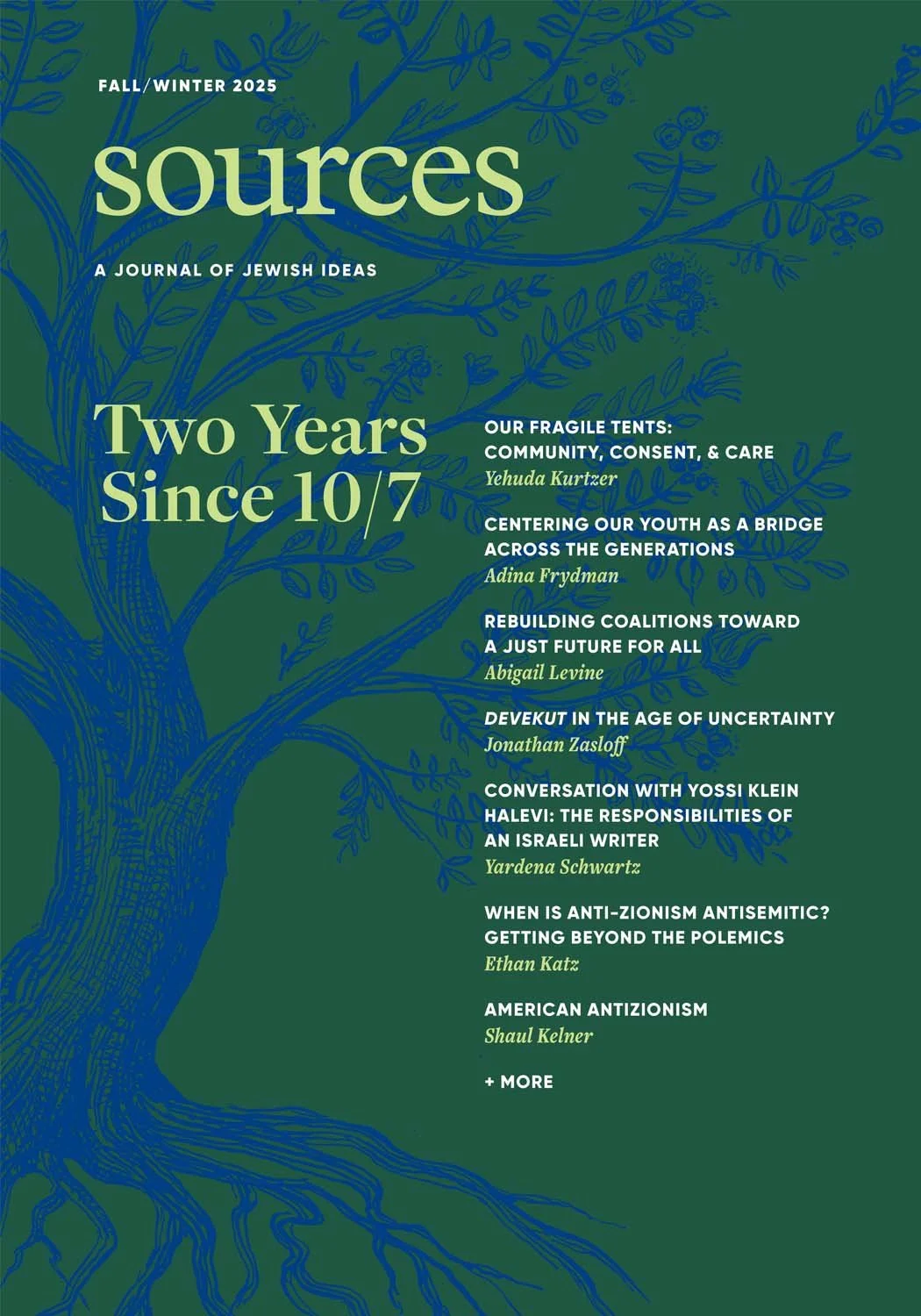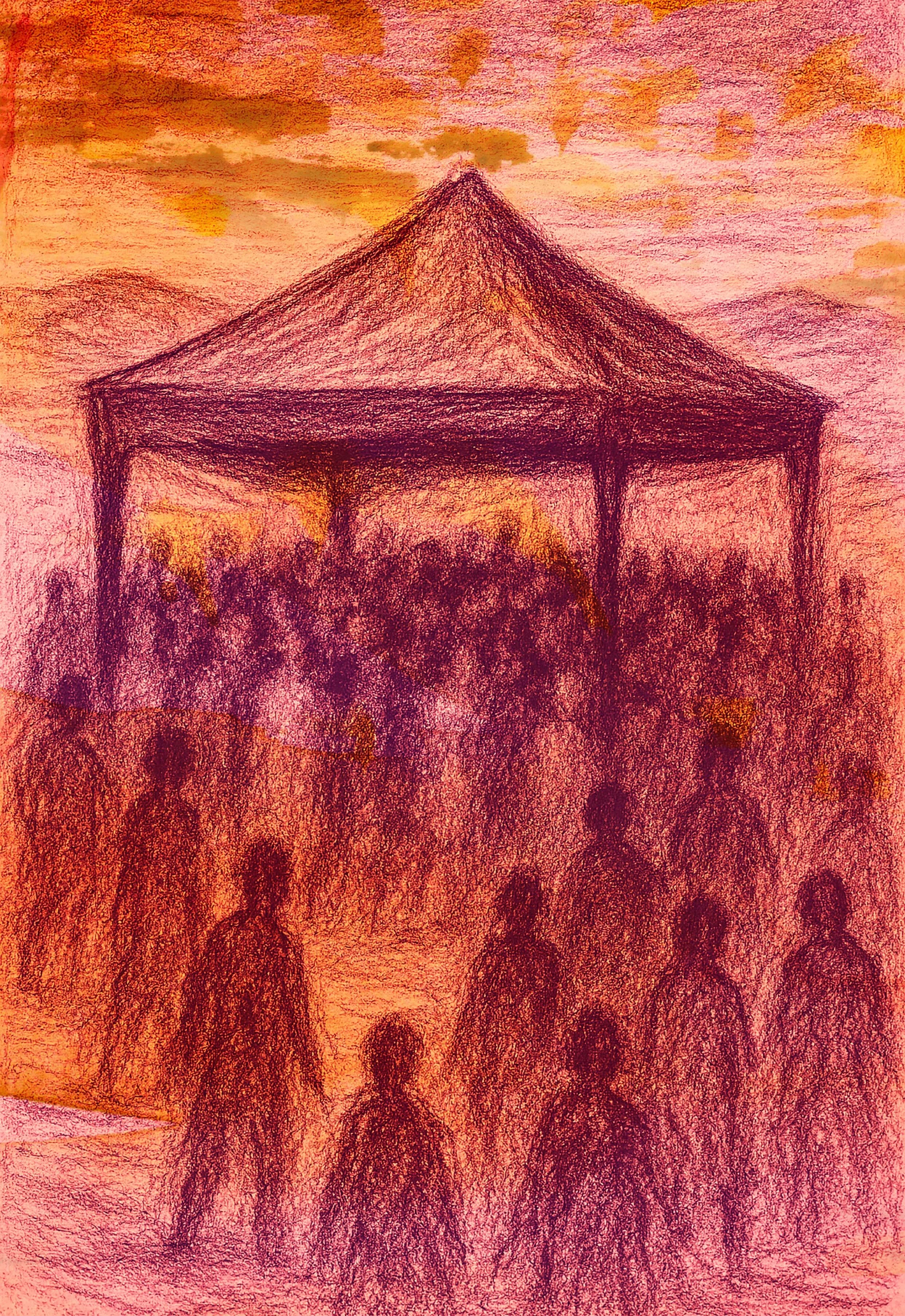Watching War: This Moment in the History of Israel-Diaspora Relations
Geoffrey Levin
Geoffrey Levin is Assistant Professor of Middle Eastern and Jewish Studies at Emory University and author of Our Palestine Question: Israel and American Jewish Dissent, 1948-1978.
For a PDF version of this article for reading and printing, click here.
Alienation. Sadness. Confusion. Anxiety. Guilt. Fear. Anger.
These are but a small sampling of the feelings that people around me are experiencing right now. Like many Jews today, I sense these emotions in the expressions of friends and family, but as a Middle Eastern and Jewish studies professor, I see them even more powerfully on the faces of my Jewish students.
Emotions can be transformative. I can tell that these weeks since October 7 will change their lives. They are rethinking their identities, recalibrating their politics, and shifting their relationship with Jewish traditions and Jewish communities. Some of these changes will last for the rest of their lives. Other changes will not.
As a historian viewing this moment in a broader American Jewish historical context, I see this as a transformative period for a generation, one that will likely leave younger Jews more closely tied to Israel but also more internally conflicted about it. One of the factors that makes this transformation so likely is just how much more contact young American Jews have with both Israelis and Palestinians than in the past.
Preexisting frameworks can help us explain these dynamics. In a 2021 Sources article titled “Liberal Zionism and the Troubled Committed,” Donniel Hartman outlined four Jewish perspectives on Israel, categories that I am finding useful in explaining how American Jews felt on October 6, how they feel now, and how I expect many will be feeling in the months to come.
Of the four categories, Hartman considers himself one of the “troubled committed”—a Jew who is “unconditionally committed to Israel’s survival” while also being “troubled” by the fact that his “commitment to human rights and equality, to treating all people as created in the image of God, is inconsistently applied” in the West Bank and Gaza.
Hartman contrasts this position with that of the “untroubled committed”—Zionists who are unbothered by systemic inequalities in lands controlled by Israel—as well as with that of the “untroubled uncommitted,” Jews uninterested in Israel, and that of the growing “troubled uncommitted.” This “troubled uncommitted” category, which includes anti-Zionists, have, in Hartman’s words, “entered the mainstream of Jewish and North American life and discourse. Recent surveys indicate that close to a third of American Jews believe that it is legitimate to associate Israel’s policies with apartheid.”
Anecdotally, the horrors of October 7 set off a surge of commitment among a wide swath of Jews, including most of those who identify as Zionist and some of those who do not. For many American Jews, especially young Jews, the message of October 7 and global reactions to it is that they are undeniably part of a broader Jewish “we”—on the good days and especially on the bad—and that “we” can only rely on fellow Jews to understand and support “us.” This challenging message is instilling or reinforcing in many Jews a sense of solidarity that will endure.
This solidarity has led many Jews to support Israel’s war against Hamas in Gaza. However, the war’s mounting civilian death toll, and the extended occupation of Gaza likely to follow it, is and will be morally troubling for many American Jews. Jews who Hartman would characterize as “troubled uncommitted” are already mobilizing in unprecedented numbers under the auspices of Jewish Voice for Peace and IfNotNow to call for an immediate ceasefire. As the war goes on, as Palestinian deaths continue to rise, as an ethically challenging post-war reality takes shape, and as calls for Palestinian equality continue to be unaddressed in the post-Netanyahu era, I predict that American Jews will grow more troubled with Israeli policies than ever before. This will lead to an even more intense version of the October 6 American Jewish landscape—a liberal American Jewish majority that feels even more that its fate is intensely connected to the Jewish state, but that is even more deeply disturbed by systemic inequalities in Israel/Palestine.
The unique horrors of this war only partially account for the intensity of American Jewish reactions. While the verb “distancing” has been used to describe trends in Israel-Diaspora relations, I think that “proximity” is the word and concept most crucial for understanding why this moment is different from any other for American Jews, and why this war will lead American Jews to feel both more connected and more troubled. For just as American Jews have more intimate direct exposure to Israeli people and culture than ever before, they also have more contact with Palestinians than ever before. Unless Israeli and Palestinian leaders both make unexpected moves in the direction of peace, equality, and humanization, there is a very fraught and uncomfortable future ahead for American Jewish identity.
Love Jewish Ideas?
Subscribe to the print edition of Sources today.
American Jews and Israelis Today: Proximity, Not Distance
It has been a challenging time for many American Jewish students on many levels, as they witness the horror of mass death in the Middle East, feel pained when the suffering of fellow Jews is ignored or trivialized, and deal directly with implicit and explicit forms of harassment.
But I think the form of pain least understood by non-Jews right now is that of unacknowledged personal grief. Israeli victims are not an abstraction for so many young American Jews today, and it is fairly common for students to know people directly affected by the brutal Hamas massacre and the war. Many, if not most, Jewish students have been to Israel or have met Israelis here, whether they be Israeli Americans, extended family, or shlichim working at their summer camps or Hillel.
These sorts of connections between American Jews and Israelis explains a lot about the nature of American Jewish pain right now and about the inability of so many of our non-Jewish friends to understand what we are going through. Indifference—and even more so, hostility—toward the Jewish pain of October 7 is not just an abstract injustice for many Jews. Rather, it is a negation of our personal mourning. Rising antisemitism pours salt into our collective wound. We cannot expect everyone to understand the complexity of the Israeli-Palestinian conflict, but many Jews did hope to receive more basic human compassion during a moment of personal and communal mourning. Jews everywhere with such expectations have been disappointed. Idealistic young college students, surrounded constantly by peers and an unrelenting atmosphere of political discourse, activism, and debate, have been struck by these feelings even more than most.
If the ubiquity of personal proximity to Israel helps to explain the nature of American Jewish pain right now, it is also key to explaining how this moment differs from all past Middle East wars for American Jews. Efforts to send American Jews to Israel—most notably Birthright-Taglit, among many other subsidized trips—mean that young American Jews today are far, far more likely to have experienced Israel firsthand than their parents or grandparents were at the outset of the wars of 1948, 1956, 1967, 1973, or even 1982 and the two Intifadas. Technology has also bridged the distance between American Jews and Israelis. This includes the growing availability of Israeli news in English, including sources like the Zionist centrist Times of Israel and the center-right Jerusalem Post, as well as Haaretz English, +972 Magazine, and other publications on the left.
The argument that young American Jews are “distancing” from Israel draws from surveys that show, among other things, declining support for Israeli policies amidst the country’s long rightward drift. But Israelis have been humanized to American Jews, no less and in some ways far more intimately than in the glory days of Israel-Diaspora ties right after 1967. Jews of all political stripes are only a degree, or two or three, away from Israeli victims of this war, and many young American Jews are becoming embittered and alienated by their unacknowledged grief. The effects of this pain will last.
Echoes from the Past
One reason I am so confident of the lasting impact of these feelings is not just because of what I see in the classroom and during office hours. It is from what I see in my research.
Research for my forthcoming book, Our Palestine Question: Israel and American Jewish Dissent, 1948-1978, involved taking a deep dive into archival material from the 1940s through the 1970s. This included Jewish organizations’ public material, but also more intimate sources: American Jews’ memoirs, letters to family members, diaries, internal organizational correspondence, interviews, and oral history transcripts. I was able to see trends in the evolution of Jewish politics, and I developed a sense of which events left a deep impact on individuals and organizations and which did not. The emotions and rhetoric of the past echo today, and, to some degree, sources from the past foreshadow the terrible crises of the present.
One comparison to the present crisis facing American Jews is a series of debates that erupted in the late 1960s and continued into the 1970s. For American Jews, the Six Day War of 1967 and the threatening mobilization of Egyptian troops leading up to it elicited a rollercoaster of emotions as Israel defeated the Arab states surrounding it in less than a week. At that moment, with Israel’s existence threatened, many American Jews found themselves realizing for the first time how much the Jewish state meant to them, and they united to mobilize in support, much the way many Jews felt and responded after October 7. Many decades later, older American Jews still harken back to feelings of attachment that were first awakened in 1967. The brevity of the Six Day War and the relative ease with which Israel won meant that there was little time for more complicated feelings or resentments to arise.
Yet the positive feelings surrounding Israel’s 1967 victory were soon interrupted and for some, overtaken by another set of relevant emotions.
During the summer of 1967, an article in a little-known publication called The SNCC Newsletter shocked American Jews when it became one of the first outlets affiliated with the New Left to publicly embrace the Palestinian cause.
SNCC, known originally as the Student Nonviolent Coordinating Committee, emerged in the early 1960s as a significant force in the civil rights movement. With politics resembling those of Martin Luther King’s Southern Christian Leadership Conference, SNCC organized student sit-ins and worked to mobilize Black voters in the South. By the mid-1960s, however, SNCC was moving in radical new directions, rejecting white participation, and renaming itself the Student National Coordinating Committee as it renounced nonviolence. SNCC’s leaders increasingly identified their struggle with those of subjugated “Third World” peoples overseas. This involved embracing a Black internationalist vision that identified with the Arab world and Islam, particularly as more African Americans embraced Islam, and Afro-Arab cooperation within the global Non-Aligned Movement increased.
In this context, SNCC member Ethel Minor wrote “Third World Roundup – The Palestine Problem: Test Your Knowledge” in the June-July 1967 issue of The SNCC Newsletter. Her article listed 32 “facts” about Israel. Some of these were standard pro-Palestine talking points grounded in reality. Other “facts,” however, drew from longtime antisemitic conspiracy theories and/or baselessly framed Zionist Jews as the scourge of Black peoples everywhere.
The ensuing controversy foreshadowed countless more in the years to come. Mainstream Jewish organizations condemned SNCC. The many young American Jews who had volunteered within the civil rights movement felt alienated and resentful. Many Jews once involved with SNCC voiced their inability to support it any longer, with the most notable being actor and folksinger Theodore Bickel, who penned an open “Farewell to SNCC” letter in August 1973.
Many other left-wing activist groups, both Black and white majority, also vocalized their support for the Palestinians after the 1967 war. These years also saw rising attacks against Israelis by the Palestine Liberation Organization’s (PLO) different factions and offshoots, leading American Jews to feel exasperated by American leftists’ unwillingness to condemn terrorism targeting civilians. Upset and angry, many Jews left such organizations in the late 1960s, though a not- insignificant number of Jews remained in radical groups and aligned themselves with the Palestinian cause.
Of those who abandoned the New Left, many formed radical Zionist organizations aiming to synthesize their leftist and Zionist commitments. Many of these groups and organizations were local, like the New York-based Jewish Liberation Project, Boston-area New Zionists, the Jewish Liberation Coalition of Providence, and others, but together they formed a loose umbrella group called the Radical Zionist Alliance that issued statements in the early 1970s.
Other Jews who abandoned the New Left during this period went on to become associated with what is now known as neoconservatism, stemming in part from the feeling that being on the political left was incompatible with Zionism. The Jews who remained allied with increasingly pro-Palestine left-wing circles, such as those who founded the Middle East Research and Information Project (MERIP), agreed with those budding neoconservatives that their radical commitments were incompatible with Zionism, but they instead left their Zionism behind, if they had any such feelings or commitments in the first place.
Many of the emotions that these Jews reported during the late 1960s and 1970s mirror those I see today. Having observed the trajectories of Jewish individuals who held this wide range of responses to 1967 and afterward, it is clear to me that the emotions of that moment have been defining for many people’s politics. This includes some who felt such a strong burst of commitment that they ultimately made aliyah to Israel, and some on the other end who have had strained ties with the mainstream Jewish community ever since.
Of course, because the horrors of October 7, as well as the worldwide embrace of the Palestinian cause and the spike in antisemitism we are seeing in 2023, are all much greater than in 1967, emotions are even more intense. Among many Jews, feelings of commitment to Jewish statehood and/or their closeness to other Jews have grown and will stay that way. It is hard to forget callous acts of antisemitism against oneself and one’s community. Scars from the vandalism of synagogues are more challenging to cover up than the spray paint itself. A student of mine who endured violent antisemitic yelling in his hometown on October 8 will never forget it. He and others will also never forget who stood with them afterward, and who did not.
Palestine Solidarity and the Future of American Jewish Community
An important aspect of Donniel Hartman’s 2021 article was his acknowledgment of the growing “troubled uncommitted” segment of American Jewry, which includes self-identified anti-Zionists and many of those who support the association of Israeli policies with apartheid. While it is true that this demographic is growing, it is not without precedent, and perhaps in determining how to respond to this trend, it would be helpful for American Jewish leaders to consider how non-Zionist and anti-Zionist Jews were treated in the past.
The fact is, even though a majority of American Jews have always supported Israel, ever since the Jewish state was created, there have been American Jews deeply unsettled by Israel’s policies toward the Palestinians and its leaders’ overall attitude toward Arabs. In Israel’s early decades, when many fewer Americans made it to Israel, the people most troubled by Israeli policies were often those exposed to both Israeli Jewish and Arab voices because they spent a significant amount of time in the region. This included the founders and leaders of the first national Jewish organization to support what we now call the two-state solution, Breira, whom we might also describe as the first highly visible American Jewish group to fit into what Hartman would call the “troubled committed” category. Despite Breira leaders’ attachment to Israel and their commitment to the Jewish community, the organization dissolved in 1977, only four years after its founding, amidst harsh critiques from many in the organized American Jewish establishment. Some of Breira’s leaders went on to play highly active roles in mainstream American Jewish life; others, who started off as enthusiastic young people committed to Jewish community, ended up feeling alienated and disenfranchised for many decades.
In reflecting on past and present, here too, proximity explains the difference. Today, just as far more American Jews have seen Israel, so, too, have many more encountered Palestinians and heard about their experiences—whether through their travels to the Middle East, various media channels, or conversations with classmates. I have students with Palestinian friends who have lost dozens of relatives to Israeli bombs in Gaza. How can anyone expect them not to be upset about that? Is it a surprise that many Jews are mobilizing to end this war immediately, given that horror? This is a deeply depressing situation on so many levels, and while it is easy to divide people into categories, remember that some Jewish students right now are simultaneously suffering from antisemitic harassment while also trying to make sense of mass Palestinian deaths, either privately or through public activism.
It should not be controversial to say that there is a disconnect between the liberalism that many American Jews embrace as a minority in our democracy, and the way Zionism has been implemented in Israel, especially in terms of Israel’s policies toward the Palestinians. As much as I have been listening to my students discuss the pain of rising antisemitism, I have also heard many young Jews grappling with the troubling realities of Israeli policies’ often brutal impact on Palestinians. I urge American rabbis and other Jewish community leaders to listen seriously to these voices if they care about the future of the Jewish diaspora, not to simply condemn and excommunicate Jews who are trying to express their pain over the deeply troubling things that Palestinians experience both in their daily lives and during this war.
Many American Jews featured in my book ended up feeling alienated and disenchanted with Jewish communal life because of the harshness of their community’s response to even mild advocacy for Palestinian wellbeing. Their stories should be a cautionary tale for anyone who envisions a big-tent American Jewish community. Jewish leaders worldwide must be mindful of the reality of diverse and polarized opinions within our community. If one believes in the idea of Jewish peoplehood and frames oneself as a leader of Jews, the feeling, opinions, and emotional wellbeing of pro-Palestine Jews should matter, too.
Historically, many Israeli officials actively worked to undermine American Jewish engagement with Palestinian rights. However, David Ben-Gurion, unpredictable figure that he was, had a particularly interesting perspective on the issue. In 1957, he spent hours discussing Israel and Jewish politics with Lessing Rosenwald, chairman of the board of America’s most outspoken anti-Zionist Jewish organization at the time, the American Council for Judaism. That same year, Ben-Gurion also met with leaders of the then non-Zionist American Jewish Committee who urged the Prime Minister to lessen the onerous restrictions faced by Israeli citizens of Palestinian Arab background.
While Ben-Gurion defended his policies, he also made it clear that Diaspora Jews were free to criticize his stance. “As a Jew, you have a right!” he declared, according to minutes of the meeting in Israeli archives.
Ben-Gurion is, for many reasons, not someone either Palestinians or anti-Zionist Jews view positively. But for Zionists today, his words might hold a lesson about an older, more open Zionist attitude toward Diasporic Jewish expression, even on sensitive issues such as security, Palestinian rights, and anti-Zionism. Jewish leaders might look toward them as they prepare for a community more “committed” and more “troubled.”[1]
Endnotes
[1] Much of the historical information within this article comes from chapters 3, 4, and 6 of Geoffrey Levin, Our Palestine Question: Israel and American Jewish Dissent, 1948-1978 (Yale University Press, 2023) and the sources cited there. This article also draws from recent books by Pamela Pennock and Michael Fischbach.
For a PDF version of this article for reading and printing, click here.




